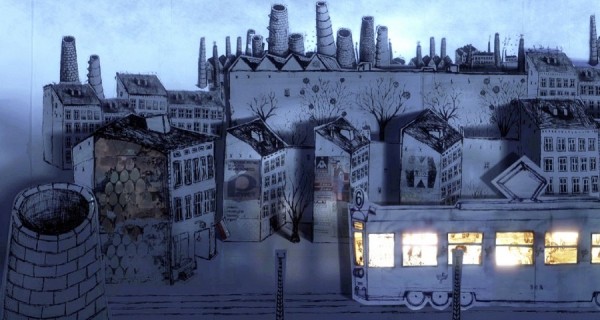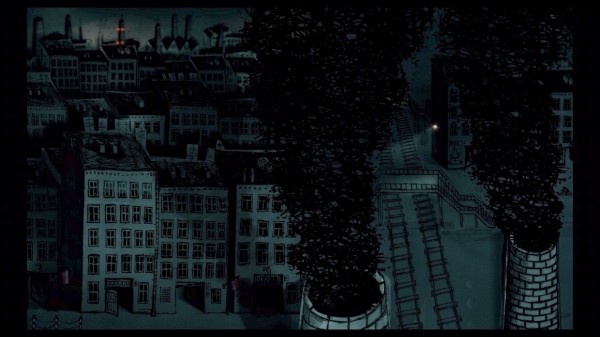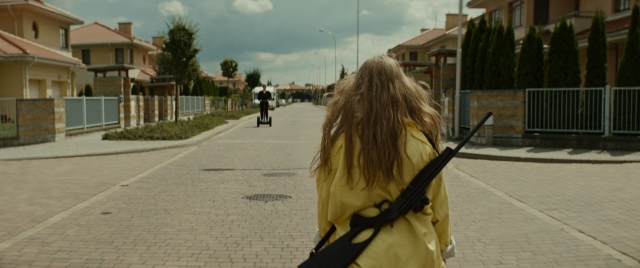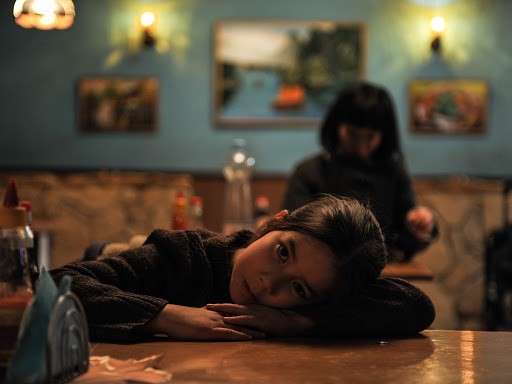-
SUPERNOVA (Bartosz Kruhlik 2019)
BARTOSZ KRUHLIK: SUPERNOVA (2019)

MARCIN HYCNA IN SUPERNOVA
A finely crafted disaster on a country road
In movies, a shitstorm can be a thing of admirable construction, which some directors approach with a fine sense of craft. Such is the case here. Supernova is about a terrible multi-victim accident on a country road in the middle of a summer Sunday. All is bright and clear. The event itself takes only a fragment of the short feature length run-time. In fact it happens before we know it. But what unfolds is a fine twittering machine of interconnected explosions and implosions.
At first, a couple is fighting. The woman, with only a sling bag and her two small children, is leaving her drunken, whiney husband Michal. She is simply walking away down the road. He tries to stop her, desperately, and she hesitates, yielding to his embrace, but then goes on.
Suddenly there's a fancy new Audi and three bodies scattered on the road - the mother and the two kids. It's a hit-and-run. Only not quite. The driver is still there, but he is not interested in helping the victims, though he checks them briefly. The mother appears alive.
This is a country road, but it can't be far from civilization. Three layers of cops come, and several layers of medical help, and later a crowd from town, eventually a news camera. Finally, because the guilty driver is a government official, henchmen come, including a lawyer with long hair and a fancy suit. The most particular aspects of this event are, first, that there are a number of people present connected personally to the victims, and, second, that the political status of the perpetrator leads him to function in a particular way. He will think he has everything under control, or that is what he'll tell himself and others. Later, and in this environment hostile to him and friendly to the victims his illusion of invulnerablity will gradually evaporate.
The movie is about the social interactions that unfold from this one sudden tragic event. The senior of the first two cops to come is a cousin of the victims. He is a good example of how we observe people for a while before knowing what's going on with them. He looks worried and disturbed, but we don't know why for a while.
Among the citizens who later come to the scene, an older one is the grandfather. The senior ranking officer of all the policeman, in plain clothes, also an older man, is faced with a hideous dilemma, because he will have the burden of protecting the guilty politician, but his connections are local. He is screwed, and what's worse, this has happened when he was on the brink of retirement. The drunken husband is still there and he complicates things immensely. But so does the older cop who is a relative. This is Catholic country, and a priest comes and holds a ceremony that provides satisfaction to the numerous troubled locals.
Surprisingly, but interestingly for the action, the perpetrator of the accident, Adam Nowak (Marcin Hycnar) himself goes through a whole series of layered moods, ŕ la Kübler-Ross, as if going through stages of denial and grief for the demise of his own reputation. The youngest cop, though forbidden to do so, has plunged into the Audi on his own initiative and found the vehicle's detachable mini camera not only with the accident recorded on it but the bonus of a louche sex scene enacted on the hood a short time earlier.
First time director Kruhli, also the writer, experienced from nine prize-wining shorts and working with his regular dp Michal Dymek, does a fine job here of wringing maximum drama and surprise from multiple players in a complex action drama without anything ever seeming strained or false. While it's not that none of this could happen during the same narrow time sequence, we are specially privileged by the filmmaker to be able to move around, observing the juiciest moments. And the pace is very good.
Supernova, 78 mins., with Marek Braun, Marcin Hycnar, Marcin Zarzeczny, debuted at Gdynia Polish Film Festival Sept. 16, 2019, showing also in at least nine other festivals including Santa Barbara, Glasgow, Dublin and Cheltenham. Screened for this review as part of the seven-film virtual Brooklyn Academy of Music Apr. 30-May 6, 2021 Kino Polska series.
Last edited by Chris Knipp; 04-29-2021 at 01:52 PM.
-
KILL IT AND LEAVE THIS TOWN (Mariusz Wilczynski 2020)
MANUSZ WILCZYNSKI: KILL IT AND LEAVE THIS TOWN (2020)

OLD CITY OF ŁODŹ IN KILL IT AND LEAVE THIS TOWN
Sick Polish soul in hand animation drenched in memories
Prolific Polish multi-media artist Mariusz Wilczyński's hand animated film, the product of what he says is over a dozen years of work, may seem dark, surreal, and shocking. But in a short YouTube intro he describes it as primarily a work full of love, a revisiting of his parents, the haunted but familiar city of Łódź, and his lost friend Tadeusz Nalepa (dead since 2007) whose music we hear throughout, its soulfulness providing a continua bottom note of warmth and soul. This complex, indigestible film deserves our patience because it's an expansion of visual worlds. We in America, lulled with the tamed, rounded off computerized images of Disney or PIxar or the sweetness of Studio Ghibli in Japan, forget the long edgy tradition of Slavic animation, which this film represents for us afresh in particularly sui generis and intractable form.
Jessica Kiang's Variety review points out some of Wilczyński's images of people evoke "the politicized caricatures of George Grosz or the ghouls of Otto Dix meeting the surreal grotesqueries of Jan Svankmajer or Jiri Barta, minus the aesthetic intricacy." This - Grosz and Dix, anyway - represents a great activist tradition. Mind you, this film is very personal and intimate about life. Peter Bradshaw, who is admiring and says we can come back to the film again and again - which one can, because it has no narrative to get tired of, notes this is "animation which takes a fiercely miserable satirical stab at the world and itself, a language which is unreconciled, unaccommodated." Kiang says this film works so far outside the norm it reminds us just how "narrow" that norm can be.
A certain crudeness is intentional, and, if you are a little sick of the blandness of Pixar, has a welcome individuality and lack of polish. "Wilczyński serves up brutal images," says Bradshaw, "often drawn on lined paper, for all the world as if that was the only thing to hand when he decided to spill his imaginative guts. . . Here is the Neue Sachlichkeit [Dix, Grosz et al.] reborn; yet the realism is overwritten by something hallucinatory and nihilistic, but also funny in a bleak Beckettian sort of way."
Indeed Beckett is who I eventually began thinking of, life dialed down to its tragicomic minimum. But the filmmaker's most personal memories and loves are buried here too, with their place of earliest origin. "When I close my eyes," Wilczyński has said, "I see Łódź. I know where I smoked my first cigarette, I know how I felt at any given moment. It was here I read Dostoyevsky, Stachura, Nabokov and Mann for the first time. In Łódź, I listened to Breakout, Frank Zappa, Miles Davis and John Coltrane here. It was all very strong and intense."
The lady who reviewed the film for The New York Times seems quite clueless and out of tune (which can happen with them), but she is right in noting the film is "plotless, gloomy and surreal — is more a direct translation of feelings and sensations than a traditional work of storytelling." The unity is emotional and internal but not narrative. Wilczyński illustrates his parents and his friend and from his YouTube introduction he means the memories to be of love (love for his ugly but now lost and missed industrial hometown of Łódź also). Nonetheless we see a son like Wilczyński seeming to brush off his dying mother in a hospital, who is then seen being sewn up after her death with heavy cord belly down to genitals. Severed heads roll on the street and humans defecate on sidewalks. Little human bodies are chopped up like fish.
Later, there is a memorable time when the boy and his father went on a train trip to another town, and the father forgot to call home to tell his wife they had arrived safely. A smirking woman station agent takes the call, promising to check (but how could she?) as she puts on makeup to go on a date. A happy journey has turned into a nightmare memory.
Transitions are sudden, and scale is violated with heads that grow tiny or gigantic at a whim. The big unflattering bulbous profile of the artist himself looms over everything for a while. It has been pointed out that in rendering human faces different animators do it so differently they don't match from panel to panel: note it is not Wilczyński who does the drawing but three different animators, with a supervisor.
Kill It has received wide recognition. It won the Grand Prize for Feature Animation at the Ottawa International Animation Festival and FIPRESCI Award at the 2020 Viennale. "Fleeing from despair after losing those dearest to him, the film's hero hides in a safe land of memories where time stands still and those dear to him are still alive. Over the years, a city grows in his imagination, filled with cartoon idols from his childhood, until the hero discovers that eternal youth does not exist and decides to journey back to the real."
Scenes combine ocean travel and trains, bathing in the sea and in bath tubs. Miniature humans are cut up and stacked in a pot as if to be prepared for eating like fish. An old couple reimagines youthful sex, then the bodies shrink and grasp canes, sinking back to age. Electric guitar songs deliver soulful, wailing Polish-language blues in the rock-heavy score by Tadeusz Nalepa, Wilczyński's late friend celebrated here. You may not come back again and again, after all; but you will remember.
Kill It and Leave This Town, 88 mins., debuted at the Berlinale Feb. 2020, shown in 14+ other international festivals including Annecy, the Viennale, Prague, and Gdynia; five awards, three nominations. Screened for this review as part of the seven-film virtual Brooklyn Academy of Music Apr. 30-May 6, 2021 Kino Polska series.

THE SOOT OF ŁODŹ IN THE FILMMAKER'S CHILDHOOD
Last edited by Chris Knipp; 04-29-2021 at 01:57 PM.
-
EASTERN (Piotr Adamski 2019)
PIOTR ADAMSKI: EASTERN (2019)

A Slavic neo-Western of feuding families and archaic social codes
Again as in Kino Polska's lead selection by Malgorzata Szumowska Never Gonna Snow Again, we see Polish society placed under a magnifying glass by shooting a film inside a gated community filled with tasteful McMansions. This time however the result is a dark and dystopian - but sometimes playful and surprising - satire in which a major source of inspiration was the Kanun, the medieval Albanian code of laws, with a contemporary nod to some current politicians' and local Polish governments' disturbing recent calls for a return to "traditional values." The chilly style is partly explained by Adamski's origins as a conceptual artist. The playfulness and surprise are indications that he's discovered a knack for this new medium. Again, and much more overtly than with Szumowska, one feels the influence or the spirit of the Greek director Yorgos Yanthimnos, especially, as points out Jack Blackwell in We Love Cinema, his Dogtooth and The Killing of a Sacred Deer.
One can imagine Yanthimos making a film like this in which a teen girl, Klara Kowalski (Paulina Krzyzanska), of the feuding Kowalski family, hunts down a young son of the Kowalski's enemy the Novaks in the woods and shoots him in the head, then she and helpers set up his body with a rifle in a ritualistic pose. Soon the response comes back to the Kowalski family that they must either pay blood money for Klara, "buy out her blood" to the Novaks through established legal procedures of retribution, or Klara in turn must die. Novak daughter Ewa (Maja Pankiewicz) is assigned to retaliate against Klara. Unless her mother (Anna Klos-Kleszczewska) is willing to pay the blood money, which, for her own reasons, not being able to afford to being a likely one, she is not. Ewa's father (Marcin Czarnik) has his own troubles, which illustrate the machismo of the system and the emasculation that can occur for those who don't live up to the cruel code.
A whole system of modernized blood feud culture is sketched in, such as funeral ceremonies where cigarettes are doled out on little trays at a crematorium. These modern Hatfields and McCoys or Capulets and Montagues drive shiny new black cars, live in their McMansions, and women just as much as men are very involved with their high tech rifles and pistols. What they do in their free time, if any, and where they get their money we don't know, but Adamski has a lot of fun playing with his own rules and constructing this conceptual Slavic "Eastern."
Speaking of own rules, when Ewa comes to see Klara, things take a different turn. It seems perhaps the modern generation may not be quite so up for getting killed back and forth and may want to improvise a whole new playbook. Ewa has a surprising improvisation. But the film has a sardonic finale which we cannot reveal here: it's important that the viewer doesn't know where things are going to go.
As Jack Blackwell points out in his review, the film suggests that an insatiable blood lust of "bruised pride" and a "patriarchal honor system" appear combined symptoms of "unchallenged casual misogyny" and "the stifling boredom of suburbia," that result in "'civilized' people going murderously mad." The mirror Adamski holds up to contemporary Poland here, Blackwell argues, reveals "an ugly reflection that, for all its absurdity, rings true in a frightening manner." But the director also simultaneously keeps on entertaining us with "an exciting cat and mouse thriller." Conceptualist Adamski clearly has hit the ground running in his new genre.
Eastern, 78 mins., debuted in Poland at Koszalin Jun. 13, 2019, showing at other festivals including Gdynia, Ischia and Raindance. Screened for this review as part of the seven-film virtual Brooklyn Academy of Music Apr. 30-May 6, 2021 Kino Polska series.
Last edited by Chris Knipp; 04-23-2021 at 10:52 AM.
-
THE TASTE OF PHO (Mariko Bobrik 2019)
MARIKO BOBRIK: THE TASTE OF PHO (2019)

LENA NGUYEN IN THE TASTE OF PHO
Vietnamese father and daughter in Warsaw living with big and small changes
This filmmaker, an Asian transplant in Warsaw, perhaps inspired by Japanese greats like Ozu, works as a miniaturist, in little touches, keeping things going with themes: a broken washing machine; a pleated skirt and an exotic school lunch a ten-year-old half-Vietnamese girl going to Polish school doesn't want; a pretty blond Polish girl in the apartment across the courtyard, viewed with binoculars; changes in the restaurant where the father is a cook. Mariko Bobrik is a filmmaker born in Fukuoka, Japan who studied filmmaking in Łódź and has stayed on in Poland. For her first feature as a director, she has chosen to focus on Vietnamese, who make up the largest Asian population in Poland.
On a larger scale, this movie is about accommodation, the father and daughter to each other; to living without their wife and mother, who has passed away. There is an Asian-style lighted shrine to her in their apartment. It's the most beautiful thing in the film. Long (Thang Long Do) lights a stick of incense in it every day. This is important to his ten-year-old daughter Maja (Lena Nguyen). Maja is, of course, more assimilated than Long. She speaks Polish as a native. Except for her appearance, she totally fits in. But Long is assimilated too.
However, he has a lot to deal with. The owner of the Vietnamese restaurant where he is the chef retires back to Vietnam and sells the restaurant to a Polish businessman. He keeps on Long, but gives the restaurant a total makeover to a very spiffy sushi - Thai food place. That's right, sushi - Thai. This is what the public wants. Never mind that people loved Long's hot noodle Pho in the wintertime. Long is sent to a school where everybody is learning to make sushi. The new owner fires the two younger Vietnamese employees who don't speak Polish and hires Satyajit (Vibhu Sharma) and Sandip (Vinay Gangvani) because they speak Polish. Well, they're Asian.
Raja is grieving for her lost mother and her fear is that her father is forgetting her and turning to the cute blond across the way (Aleksandra Domańska), whom he does pursue one evening. She also has to admit to him that she is throwing out his Vietnamese pastries that he gives her for school lunch, and switches the pleated plaid skirt he irons for her every morning for the jeans all the girls wear now. She complains that they eat rice much more than they did when her mother was alive.
The beauty of this movie is its subtlety, though it's not that subtle. It's pretty obvious that Long's attempt to repair their old broken, out of date, unrepairable washing machine and making them hand wash their clothes is clinging to the past, the lost past of his Vietnamese youth, the closer past of when his wife was alive and he worked in a Vietnamese restaurant where his Pho was the most popular item.
Long seems totally inexpressive at first, but it comes to be clear that's him coping. He's not shut down; he simply has an equitable disposition. And he and Raja cope very well with each other. It seems something of a miracle that Long remains the chef of this fancy transformed sushi - Thai restaurant. Now he has taught Satyajit and Sandip to make Pho and he's grinding out sushi. But it's working. He has resisted the temptation when all these restaurant transformations hit him to go back to Vietnam. This is home now. And above all, it's home for his daughter, the home that links her to her mother. His announcement to Raja that he can make any kind of cuisine is a triumph: pho is a beautiful thing, but it's not his whole identitiy. He has acquired the survivor's spirit of transformation.
The color scheme is subtle and low key. The score by Japanese jazz pianist and composer Aki Takase is low key. The whole film is low key. Sometimes it feels repressed: when there is a group of Polish children playing with Raja at her home one long afternoon, suddenly things seem to burst with a humor and energy missing before. The Taste of Pho settles for charm and cuteness at the end. But the relationship of Raja and Long feels real.
The Taste of Pho, 84 mins., debuted at San Sebastián Sept. 23, 2019, showing at some other international festivals including Piec Smaków and Osaka. Screened for this review as part of the seven-film virtual Brooklyn Academy of Music Apr. 30-May 6, 2021 Kino Polska series.
Last edited by Chris Knipp; 05-01-2021 at 09:53 AM.
 Posting Permissions
Posting Permissions
- You may not post new threads
- You may not post replies
- You may not post attachments
- You may not edit your posts
-
Forum Rules





 Reply With Quote
Reply With Quote




Bookmarks